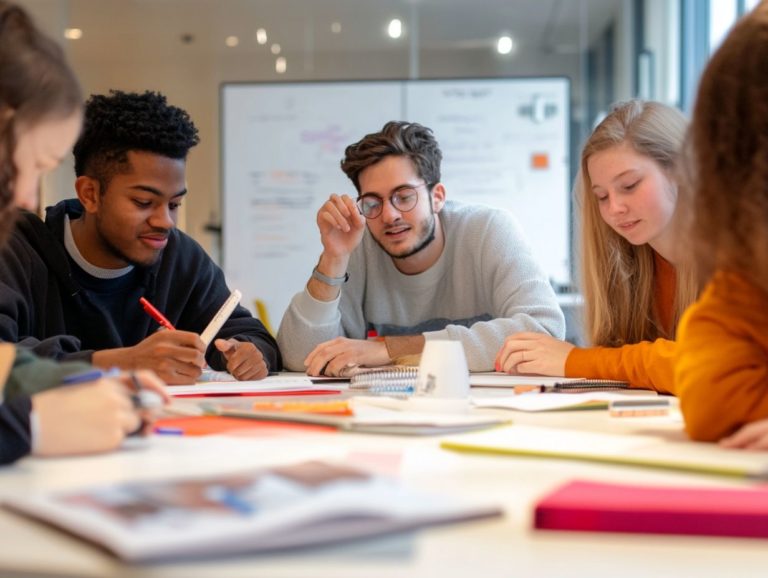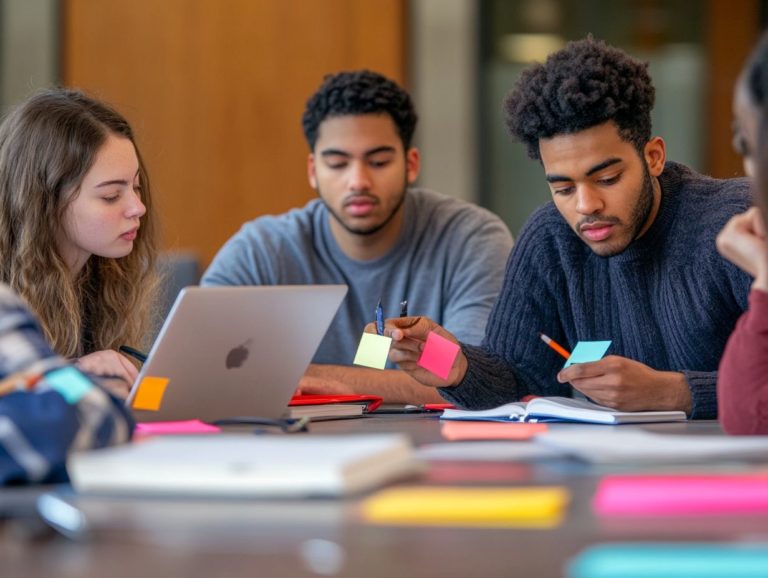the science behind study techniques and learning
In today s fast-paced world, mastering the art of learning has become more essential than ever. This article delves into the science behind how your brain absorbs and retains information, offering valuable insights into effective study techniques that can elevate your learning experience.
You ll explore everything from crafting a personalized study plan to maximizing your memory and focus, with practical tips tailored for various learning styles. Whether you identify as a visual, auditory, or kinesthetic learner, you ll discover strategies designed to empower you in achieving your academic goals.
Get ready to unleash your full learning potential let s dive in!
Contents
- Key Takeaways:
- The Science of Learning
- Effective Study Techniques
- Creating a Study Plan
- Maximizing Learning Potential
- Studying for Different Types of Learners
- Preguntas Frecuentes
- Cu l es la ciencia detr s de las t cnicas de estudio y el aprendizaje?
- Por qu es importante entender la ciencia detr s de las t cnicas de estudio y el aprendizaje?
- Cu les son algunas t cnicas de estudio comunes basadas en la ciencia del aprendizaje?
- C mo procesa y almacena el cerebro la informaci n para el aprendizaje?
- C mo puede la ciencia detr s de las t cnicas de estudio y el aprendizaje ayudar con la preparaci n para ex menes?
- Existen t cnicas de estudio personalizadas basadas en la ciencia del aprendizaje?
Key Takeaways:

Understanding how our brains learn is crucial in developing effective study techniques. Proven methods for retaining information include spaced repetition, active learning, and self-testing. A well-developed study plan can help maximize learning potential and improve memory and focus.
The Science of Learning
The Science of Learning encompasses a rich tapestry of theories and principles that delve into how you acquire, process, and retain knowledge over time. This field combines ideas from cognitive psychology, educational psychology, and cognitive neuroscience, aiming to unravel the complex mechanisms at play in the learning process.
By examining research findings, you can craft effective study strategies that not only enhance your memory retention but also foster long-term learning outcomes.
Understanding How the Brain Learns
Understanding how your brain learns is essential for crafting effective study strategies that accommodate various learning styles. By looking into the realm of brain science, you can uncover the cognitive processes that drive memory formation and retrieval, ultimately enriching your educational experience.
Research indicates that your brain is composed of intricate networks that play a crucial role in how you process information. These networks significantly influence your engagement with different study techniques.
For example, the hippocampus is key in consolidating new memories. This means that repetitive review can be a powerful tool for improving retention.
On the other hand, the prefrontal cortex is vital for problem-solving and critical thinking. This suggests that interactive learning methods, like group discussions and hands-on activities, can enhance your cognitive engagement.
By examining the relationship between these brain mechanisms and your learning strategies, you can personalize your approach to better meet your educational needs.
Effective Study Techniques
Using effective study techniques can supercharge your academic success! Research in educational psychology has pinpointed several key strategies that can elevate your learning experience.
Methods such as self-testing, spaced practice, and mixing different subjects during study sessions not only improve your learning outcomes but also promote long-term knowledge retention.
By incorporating these strategies into your study routine, you can unlock your full potential and achieve your academic goals.
Proven Methods for Retaining Information

Proven methods for retaining information, such as strategies that help you think and learn better, are essential for effective test preparation. These techniques enhance your memory retention and elevate your overall educational effectiveness, ultimately leading to better academic performance.
Research in cognitive neuroscience shows that spaced repetition capitalizes on your brain’s natural forgetting curve, enabling you to reinforce your knowledge over time and enhance long-term recall.
Self-testing also engages active retrieval processes that solidify your learning pathways. You can seamlessly incorporate these methods into your study sessions by scheduling multiple, shorter review periods instead of cramming at the last minute.
Utilizing flashcards or practice quizzes during exam preparations will not only showcase your mastery of the material but also actively reinforce retention and build your confidence ahead of test day.
Start applying these techniques today and watch your grades soar!
Creating a Study Plan
Crafting a study plan is vital for academic success. It lays the groundwork for a structured study schedule that boosts your learning.
A well-organized plan fosters effective habits and unlocks your learning potential. This can significantly enhance your performance.
Steps to Develop a Successful Study Plan
Follow these steps to create a successful study plan: identify your learning goals, choose effective study techniques, and monitor your progress.
Break down larger objectives into smaller, manageable milestones. For example, if you want to improve your math skills, set a goal to master one concept each week.
Incorporate different study techniques like active recall and visual aids. Experimenting helps you find what works best for you.
Regularly check your progress to stay accountable. Adjust your strategies as needed to keep your plan effective and personalized.
Maximizing Learning Potential
Maximize your learning potential with a thoughtful approach. Use strategies that improve memory, focus, and active engagement.
Blending effective techniques with innovative methods can elevate your academic skills and change how you absorb knowledge.
Tips for Improving Memory and Focus

To improve memory and focus, implement various techniques based on educational psychology. Try visualization, mnemonic devices, and taking regular breaks.
Visualization involves creating mental images of what you’re learning. Research shows these images help you remember information better.
Mnemonic devices, like acronyms or rhymes, simplify complex information, making it easier to recall.
Incorporating regular breaks, known as the Pomodoro Technique, allows your brain to recharge. This helps maintain focus and engagement.
Studying for Different Types of Learners
Studying for different types of learners requires tailored approaches. Address the unique needs of visual, auditory, and kinesthetic learners.
Understanding these differences helps educators and students implement effective strategies that enhance learning.
Strategies for Visual, Auditory, and Kinesthetic Learners
Strategies for visual learners include using diagrams, charts, and videos. Auditory learners thrive on discussions, lectures, and sound-based study techniques. Kinesthetic learners, in contrast, flourish through hands-on experiences and movement-based activities.
Tailor these strategies to fit your needs for a better learning experience. As a visual learner, you might engage more deeply with materials by employing tools like infographics or color-coded notes. This makes information organization intuitive and effective for you.
If you identify as an auditory learner, study groups might be your secret weapon. Participating in lively discussions or using podcasts can reinforce concepts in a way that resonates with your learning style.
Kinesthetic learners often find success by incorporating role-playing or sensory activities into their study routines. This allows them to connect physical actions with academic content.
Embracing personalized learning approaches deepens your understanding of the material. It also cultivates effective study habits that lead to long-term retention.
Preguntas Frecuentes
Cu l es la ciencia detr s de las t cnicas de estudio y el aprendizaje?

La ciencia detr s de las t cnicas de estudio y el aprendizaje es un campo de investigaci n que estudia los m todos m s efectivos para retener informaci n y mejorar el rendimiento acad mico. Se basa en hallazgos de la psicolog a, la neurociencia (el estudio del cerebro y el sistema nervioso) y la educaci n para entender c mo el cerebro procesa y almacena informaci n.
Por qu es importante entender la ciencia detr s de las t cnicas de estudio y el aprendizaje?
Entender la ciencia detr s de las t cnicas de estudio y el aprendizaje ayuda a los individuos a mejorar su rendimiento acad mico. Utilizando m todos basados en evidencia que han demostrado ser efectivos, se puede beneficiar tambi n a educadores e investigadores para desarrollar estrategias de ense anza que ayuden a los estudiantes de todos los niveles.
Cu les son algunas t cnicas de estudio comunes basadas en la ciencia del aprendizaje?
Algunas t cnicas de estudio comunes incluyen la repetici n espaciada, la pr ctica de recuperaci n, la interrogaci n elaborativa y la intercalaci n. Estas t cnicas implican espaciar las sesiones de estudio, recordar activamente la informaci n, hacer preguntas para profundizar en la comprensi n y mezclar diferentes tipos de material para promover una mejor retenci n.
C mo procesa y almacena el cerebro la informaci n para el aprendizaje?
El cerebro utiliza una red compleja de neuronas para procesar y almacenar informaci n. Cuando estamos expuestos a nueva informaci n, inicialmente se procesa en nuestra memoria sensorial y luego pasa a nuestra memoria a corto plazo. A trav s del proceso de consolidaci n, la informaci n se transfiere a nuestra memoria a largo plazo.
C mo puede la ciencia detr s de las t cnicas de estudio y el aprendizaje ayudar con la preparaci n para ex menes?
La ciencia detr s de las t cnicas de estudio y el aprendizaje puede ayudar a los individuos a prepararse para ex menes. Al proporcionar estrategias basadas en evidencia, como la pr ctica de recuperaci n y la repetici n espaciada, los estudiantes pueden mejorar su capacidad para recordar informaci n durante los ex menes y mejorar su rendimiento general.
Existen t cnicas de estudio personalizadas basadas en la ciencia del aprendizaje?
S , existen t cnicas de estudio personalizadas que consideran el estilo de aprendizaje y las fortalezas de un individuo. Por ejemplo, los aprendices visuales pueden beneficiarse del uso de diagramas y mapas mentales, mientras que los aprendices auditivos pueden beneficiarse de grabar y escuchar conferencias. Comprendiendo su propio estilo de aprendizaje, los individuos pueden adaptar sus t cnicas de estudio para un aprendizaje ptimo.
Start today and see how these techniques can transform your learning!





